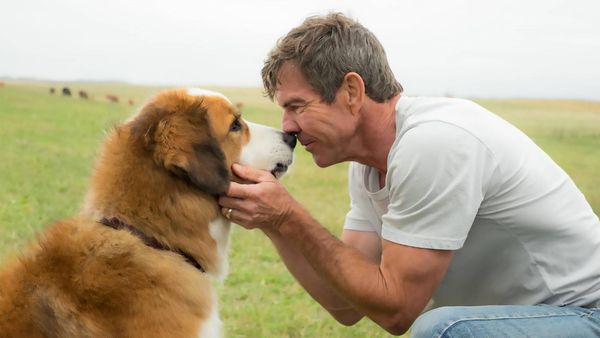
Jess is aware her dislike of dogs is limiting her dating prospects. “When I’m scrolling through a dating app, if there’s a dog in the photo, or reference to a dog in a prompt, I quite quickly swipe left,” she says.
That consigns a significant chunk of eligible heterosexual males – and the pooches they are pictured smooching – to the doghouse.
“I don’t want to deal with it, particularly if it’s one of those really muscular-looking dogs,” Jess says.
While she acknowledges “being able to nurture a pet is a nice quality”, she is simply “not a dog person and I’m a bit allergic”, which she makes clear on her dating profile. “That way [if we match] we’re the same type of weird.”
The bond between people and canines is long and deep. Humans and dogs have lived side by side for more than 30,000 years, and recent research shows the benefits of dog ownership range from better heart health to reducing loneliness.
In Australia, where there are dogs in pubs, dogs in workplaces, dogs in bedrooms, dogs on TV and soon-to-be unsedated dogs at owners’ feet on some domestic flights, there can be a stigma in not sharing in the collective love of canines. “People don’t like people who don’t like dogs,” Jess says.
Tellingly, none of the dog dislikers interviewed for this story wanted their real name used. Many said their (often undisclosed) aversion to dogs affected their professional relationships, dating life and friendships.
According to Animal Medicines Australia’s 2022 Pets in Australia report, 48% of households have at least one dog, while 33% own cats.
“It is definitely a dog-loving society that we live in,” says Dr Tiffani Howell, a senior research fellow (and dog-lover) at La Trobe University who studies the relationship between humans and animals.
While it’s not unusual to hear people talk openly about hating cats, it’s less socially acceptable to express a dislike of dogs.
“There is a different attitude towards dogs and cats in Australia,” says Howell. “It’s probably due to the risks cats pose to native wildlife.”
Dr Corrie Ackland, a clinical psychologist who treats cynophobia (an intense and debilitating fear of dogs) at the Sydney Phobia Clinic, says: “If we have a fear or dislike of cats it very often doesn’t interfere with our lives. [Whereas] dogs are so incorporated with day-to-day routines and so boisterous and are more likely to approach someone.
“The dog is the man’s best friend so there is usually an expectation that people like dogs. It can come as a surprise when someone explains that they don’t.”
‘I stopped sharing my prejudices’
For many, a dislike of dogs stems from fear that began with a negative childhood encounter.
Vicky says her unease began at the age of eight. She was playing in a local park when a stranger’s doberman pursued her friend, wrapping its large jaw around her waist.
“It was like watching a scene out of a nature documentary,” says Vicky. “My friend ended up in hospital.”
Decades later, while working in an office, conversation turned one afternoon to dogs. Joining in the banter, Vicky flippantly referred to Staffordshire terriers as “that baby-killer breed”.
“After that, one of my colleagues, who I had previously been friendly with, started giving me the cold shoulder,” she says. “It turns out her beloved pet dog was a Staffy. And she was also in her first trimester of pregnancy at the time. I felt awful. That was when I stopped sharing my prejudices about dogs with others.”
These days, Vicky puts on her “isn’t-it-cute” face when dogs try to steal her food in the park or a friend’s puppy latches on to her clothing.
Rita, from New Zealand, can trace her distrust of dogs to the mid-1980s, when as a teenager she delivered newspapers by bike around Wellington. A German shepherd that lived on her round would often roam outside its property and “terrorise” her, she recalls. “Sometimes people’s papers didn’t get delivered because I wasn’t going up [that street],” she says. One day, she says, she was getting on her bike when the dog bit her “on the bum”.
Since the start of the pandemic, Australia Post has reported a sharp rise in frequency and severity of dog attacks on its posties, attributing it to the huge increase in dog ownership. (Between 2019 and 2021 alone, Australian households took in more than a million additional dogs.)
Years later, Rita still considers most dogs guilty until proven otherwise. “I’m better with dogs that I know – so, friends’ dogs,” she says.
Her current workplace allows staff to bring pets to the office. “Supposedly there’s research showing the benefits of having a dog in the workplace because they make people feel calm,” she says. “But I’m not a fan of colleagues bringing their dogs to work. They expect you to love them but I don’t love them; they make me uneasy. And all it’s doing is distracting them and everyone around them from their work.”
Gary, whose office also allows dogs, says: “Unless you want to pat them and go ‘ooh goo goo goo gah’ all over them, you’re seen as a party pooper. I grew up with dogs but I now find them smelly.”
He also finds it irritating when too many canines turn up to his dog-friendly local pub. “Sometimes they get a little bit aggro. Not all dogs get along.”
‘There’s nothing more terrifying than a large dog bounding towards you’
Jade, who lives in Sydney’s inner west, worries about her toddler’s safety when they visit her “dog-centric” local park. While council rules stipulate dogs aren’t allowed within 10 metres of a children’s playground, Jade says this is rarely enforced. “Big dogs and small children don’t mix,” she says.
“There’s nothing more terrifying than a large dog bounding towards you in a park, and you don’t know whether it’s coming towards you to say hi or to attack you … It makes the park not accessible to all.”
Dog expert Howell says Jade’s concerns are “fully justified”.
“A lot of dogs are very well-behaved and would never hurt a fly, but you can’t always tell just by looking,” Howell says.
“It’s really important for dog owners to recognise that not everybody wants to be around dogs. It’s incumbent on the owner to ensure that their dog is always under their control … If the dog doesn’t have good recall, it probably shouldn’t be off the leash.”
Howell acknowledges many people in Australia may fear dogs, especially if they “grew up in a time when dogs were not as well controlled as they ideally are now”. In New South Wales, for instance, the Companion Animals Act, which requires owners ensure their dogs don’t escape their yards, didn’t come into force until 1998.
Cultural and religious factors also play into people’s attitudes. “In a multicultural society, there are cultural aversions to dogs,” Howell says.
Laila, who is Muslim, says growing up she didn’t know many other families in Sydney who kept dogs as pets.
“[In Islam] dogs are considered najis [ritually unclean], so you’d have to purify yourself before prayer if you’ve touched a dog. People often don’t keep them as pets for that reason,” she explains.
Laila says neither age nor exposure has made her more enamoured of dogs. “I don’t like the idea of getting fur on my hands right before I’m about to [eat] and I’m not particularly comfortable with them licking me or slobbering all over my shoes.”
She feels lucky her friends accommodate her aversion. “Some of my closest friends are dog people and I find our morning walks or our trips out to cafes for brunch are always interrupted by them getting down and petting the dogs of people walking by. They all know I’m going to keep walking.”










